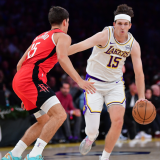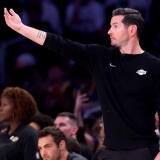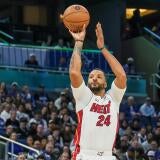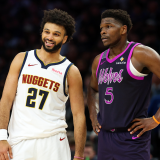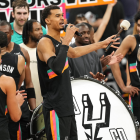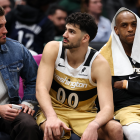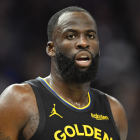Victor Wembanyama is making an admirable run at Defensive Player of the Year, but it's coming a bit too late
The Spurs rookie's defensive numbers lately are off the charts
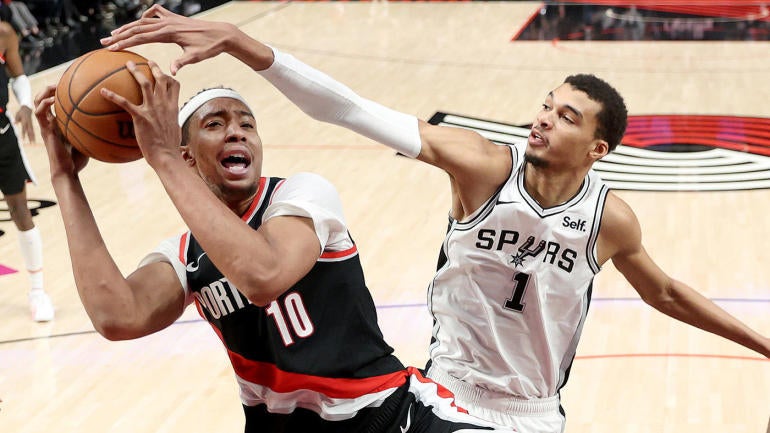
Victor Wembanyama has already more or less locked up the Rookie of the Year award, but with a bit more than a month left in his debut campaign, he's starting to make a real run at another bit of hardware. Does San Antonio's incredible rookie have a real chance to win Defensive Player of the Year? Just look at some of these defensive numbers.
- Wembanyama has 30 blocks in six games since the All-Star break. That's more than 10 teams: the Heat, Kings, Jazz, Nets, Hawks, Bucks, Blazers, Wizards, Clippers and Bulls.
- Wembanyama has twice as many five-block games (17) as any other player in the NBA this season except for Brook Lopez (9).
- Wembanyama has 72 steals thus far this season. That puts him in a tie for 15th in the NBA... except steals and blocks very rarely correlate. Among those with as many steals as he has, only Scottie Barnes is within 100 blocks of Wembanyama on the season. Barnes has 88. Wembanyama has 186. Meanwhile, Wembanyama has more steals than both Jarrett Allen (63) and Bam Adebayo (48) have blocks on the season. Those numbers feel especially notable since Allen and Adebayo are third and fourth, respectively, in Defensive Player of the Year odds at most books. Wembanyama is in second.
- The only big man to deflect more passes than Wembanyama (164) this season is Nikola Jokic (175), but Jokic, to date, has played 426 more minutes.
Right now, the books are treating Defensive Player of the Year as a largely settled matter. Rudy Gobert is sitting at -750 or worse at all of the major books. Wembanyama's shortest line is +550 at Caesar's. Barring Gobert surprisingly failing to reach the 65-game minimum, any other winner would constitute a significant upset. Yet Wembanyama leads Gobert in every statistical category we've addressed so far. So, is this a race?
Well... not really. At least historically speaking, Wembanyama has at least one major precedent standing in his way: team performance. Every winner since 2008 has played for a top-five defense. Gobert's Timberwolves are ranked No. 1 with a bullet. No team is even with two points of Minnesota's 108 Defensive Rating. Wembanyama's Spurs are on the other side of the leaderboard, ranking 24th by allowing 117.3 points per 100 possessions.
Is this necessarily a fair determinant? That depends on your perspective. Gobert obviously has significantly more defensive talent around him. Jaden McDaniels and Nickeil Alexander-Walker are far better than any defensive teammate Wembanyama has. No non-Wembanyama Spur has a D-EPM above 1. Five non-Gobert Timberwolves do.
Isolate the minutes that Wembanyama plays and San Antonio suddenly looks a lot better. The 112.1 points per 100 possessions they allow during his minutes would rank sixth in the NBA over the full season. That's somewhat remarkable given the players surrounding him, and the fact that Minnesota's defense remains statistically stable with or without Gobert on the floor only helps Wembanyama's case.
Of course, there are caveats that we need to apply to both of those figures. Minnesota opponents shoot 2.8 percentage points lower from 3-point range during Gobert's absences, whereas San Antonio opponents shoot 2.3 percentage points higher when Wembanyama rests. Wembanyama contests more 3-pointers than most big men, but opponent 3-point shooting is still fairly luck-reliant.
The five or so extra minutes Minnesota gets out of Gobert every night count as well. That's out of Wembanyama's hands, of course, but the best way to protect a bench defense is to keep it off the floor. Minnesota doesn't have to rely on its bench as much as San Antonio does, which is a point in Gobert's favor.
Even when you account for that difference in playing time, Gobert is contesting more shots per 36 minutes (12) than Wembanyama (10.9). Despite the eye test, that number doesn't really indicate that opponents are scared to challenge Wembanyama at the rim. If that were the case, the Spurs wouldn't be allowing six more shot attempts in the restricted area per game than the Timberwolves. Wembanyama is a deterrent, and he'll likely eventually become the NBA's biggest, but Gobert isn't exactly a slouch on that front, either.
Gobert holds a slim lead in defensive field goal percentage allowed (52.3% to 52.8%, per NBA.com). His rebounding advantage goes beyond the extra board Gobert grabs per night. According to NBA.com tracking data, he boxes out four times as often defensively. Rebounding tends to get overlooked in this race. A stop isn't a stop if the possession doesn't end.
Wembanyama has made up ground. He could well make up more of it in the next month, though Gobert's push for the No. 1 seed will ensure he doesn't slouch, either. But remember that the award is Defensive Player of the Year. Those early-season power forward minutes count. These preposterous recent block and steal numbers matter, but it's important not to get caught up in the moment and pretend that this has been happening for five months.
Wembanyama has a reasonable case as the best defensive player in the NBA today. It is a belt he will likely hold for a long, long time. But it's not one Gobert has willingly ceded, and the three-time Defensive Player of the Year held a much firmer grip on it earlier in the season. If we simply picked the most impactful regular-season defender in April, Wembanyama might well win it. But Gobert's entire body of work gives him enough of a lead at this point that we should assume, for now, that Wembanyama is still a year away from winning this award.
Of course, given the rate at which he's improved, could we really rule out another major in-season jump? If April arrives and those five-block nights turn into seven-block nights, there might be room for re-evaluation. No rookie has ever won Defensive Player of the Year. Wembanyama probably won't be the first, but it says quite a bit that the word "probably" is a necessary qualifier to that sentence.



